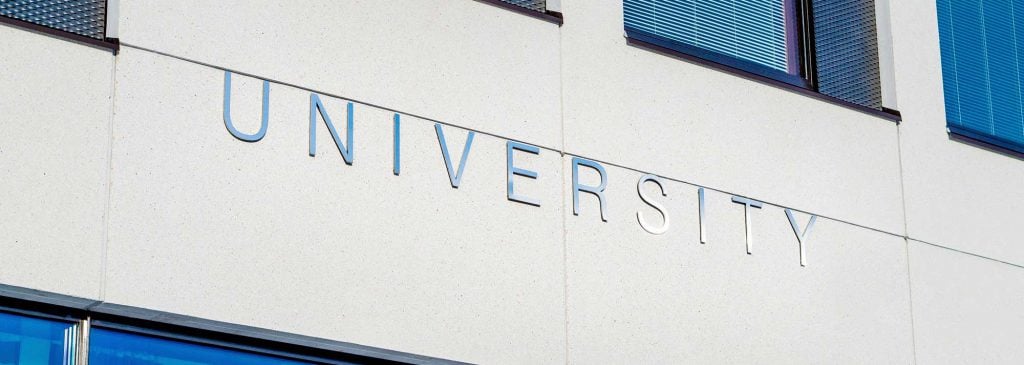Education
Taking education to the next level
04 February 2020
Education
04 February 2020

Money & Life contributors draw on their diverse range of experience to present you with insights and guidance that will help you manage your financial wellbeing, achieve your lifestyle goals and plan for your financial future.
In a first for financial planning, Deakin University will be offering the CFP® designation as part of its FASEA approved Master of Financial Planning in 2020. Find out how this initiative will help planners meet new education standards and get ahead in their career.
It’s been more than a year since new education standards prescribed by FASEA became mandatory for new entrants to the financial planning profession. With just a few years for existing planners to bring their qualifications into line with these requirements, there are plenty of options out there for planners to secure their FASEA approved degree.
Given the investment in time and fees planners make in their tertiary qualifications, many are seeking a more effective learning model that can deliver the best in value, as well as improved outcomes for their career.
To meet this demand, and uphold their commitment to delivering high-quality and flexible courses for professionals, Deakin University is the first education provider to offer students an opportunity to graduate with both an academic qualification and professional designation in financial planning.
Financial planners will now be able to complete their CFP® Certification units while studying for their Masters degree with Deakin University.
This is a great win for planners, allowing them to combine all their study requirements into a single course, obtaining their tertiary qualification and at the same time, getting the highest global financial planning designation from the peak professional body, the FPA.
“As the first university to form this type of relationship with the FPA, Deakin is demonstrating the importance we attach to ensuring our courses are engaging, meaningful and relevant to the needs of the profession,” says Marc Olynyk, Program Director for Financial Planning at Deakin Business School.
“By enrolling in an additional four units after completing a Graduate Diploma of Financial Planning, and selecting the CFP® Certification Unit as their elective option, students enrolled at Deakin University will graduate not only with a Master of Financial Planning, but will also have satisfied all of the education requirements of the CFP® Certification Program.
“Once the industry experience requirements of the CFP® Certification Program have been satisfied, students will be eligible to apply for the CFP® designation.”
It brings the education options for financial planners up to speed with other professions, like accounting, which already embed designations in their academic programs.
“The practice of nesting professional certification units in Masters degrees has been a long-standing practice, especially by CPA Australia,” says Associate Professor Sharon Taylor from Western Sydney University.
“As Chair of the Financial Planning Education Council (FPEC), I welcome this initiative as I believe it will be beneficial for both students and universities. While Deakin University may be the first to offer this configuration, I am sure other universities will closely follow with a similar design.”
Since it was established in 1992, the FPA has believed in the importance of ethics and professionalism in financial planning. And with the growing number of Australians going on to complete a tertiary-level qualification, there is an even greater need for financial planners to be educated to at least the same standard as their potential clients.
“According to the 2016 Census of Population and Housing, Australians are upskilling like never before, with 56 per cent of Australians aged 15 years and over – 9.6 million people – now holding a post-school qualification, up from 46 per cent in 2006,” says Anne Palmer, Head of Student and University Engagement at the FPA.
“Planners’ clients will be increasingly educated and they will expect their planners to also be suitably qualified. The new education requirements help to establish our industry as a reputable profession.”
However, while the FPA welcomes FASEA’s move to ‘professionalise’ financial planning with universal education standards at graduate or postgraduate level, it also understands that the introduction of a mandatory tertiary qualification increases the time and financial demands of practitioners.
“All existing planners are particularly time poor, so completing a FASEA approved degree qualification, followed by additional units of study to attain a professional designation, is going to be a significant burden for planners’ schedules, not to mention the costs involved,” Marc says. “Education providers can play a significant role in making the transition into study as easy and as flexible as possible.
“By integrating the CFP® Certification Program into Deakin’s Master of Financial Planning, existing planners are now able to satisfy the education requirements of both FASEA and the CFP® Certification Program at the same time, making a significant saving in both time and cost.
“This exciting initiative between Deakin University and the FPA has been specifically designed to provide planners with a flexible and innovative education pathway to meet the highest education standards expected of a professional.”
Now that FASEA has lifted standards for qualifications across the board, attaining a professional designation and postgraduate degree will be an important way for financial planners to elevate their qualifications and professional standing within their profession and with their clients.
“As all future planners will now need to complete either undergraduate or postgraduate studies, the combination of a higher level postgraduate qualification with a CFP® designation will be the best way to take their credentials to the next level,” Anne says.
“According to the Australian Bureau of Statistics, 45 per cent of undergraduates now go on to complete postgraduate qualifications.
“This initiative helps busy planners who wish to differentiate themselves now that basic tertiary education requirements have been specified by FASEA. This integrated program is a win-win for planners who want to get ahead, as it reduces the study load and costs of achieving a Masters and their CFP® designation.”
This new partnership also is advantageous to aspiring financial planners just starting to study for a new career. The knowledge, skills and professional attributes gained from completing both an academic qualification and a professional designation will significantly add to the employability of new entrants and demonstrate their commitment to becoming a true financial planning professional, says Marc.
“The more the profession is able to do to prepare new entrants with the capabilities and competence required of a financial planning professional, the greater success the industry will have in both attracting and retaining new planners into the profession.”
Drawing on its long history with key professional associations, Deakin has designed the Master of Financial Planning course to include opportunities for new entrants to gain a number of practical skills and competencies required of a professional financial planner.
These include:
The modes of delivery for this program also provide students with a significant degree of flexibility in where, when and how they complete their studies.
“All units are offered in a rich online delivery mode, allowing students the flexibility to study at a pace and place that suits their requirements,” Marc says.
“To fully support planners who have a preference for face-to-face delivery or are new to academic study, students are able to undertake FASEA’s three bridging units (Ethics, Behavioural Finance and Financial Advice Regulations) in an intensive class-based delivery mode. This provides students with the ability to network with other planners, receive on-the-spot tuition from presenters, and have access to hands-on learning support to complement the extensive amount of online learning material provided.”
He adds: “Deakin has a long history of working closely with key professional associations and organisations to provide flexible and innovative education pathways into further study. This industry partnership will provide both existing and emerging financial planners with a significant point of differentiation in this new era of financial planning in Australia.”
***
Deakin Financial Planning has fully integrated the CFP® Certification Program within its Master of Financial Planning. Discover what this means if you already work as a financial planner or are looking to study for a career in the profession.
For existing financial planners:
For new entrants:
***
Tags in this article: Education
 | Taking education to the next level04 February 2020 In a first for financial planning, Deakin University will be offering the CFP® designation as part of its FASEA approved Master of Financial Planning in 2020. Find out how this initiative will help planners meet new education standards and get ahead in their career. It’s been more than a year since new education standards prescribed by FASEA became mandatory for new entrants to the financial planning profession. With just a few years for existing planners to bring their qualifications into line with these requirements, there are plenty of options out there for planners to secure their FASEA approved degree. Given the investment in time and fees planners make in their tertiary qualifications, many are seeking a more effective learning model that can deliver the best in value, as well as improved outcomes for their career. To meet this demand, and uphold their commitment to delivering high-quality and flexible courses for professionals, Deakin University is the first education provider to offer students an opportunity to graduate with both an academic qualification and professional designation in financial planning. Financial planners will now be able to complete their CFP® Certification units while studying for their Masters degree with Deakin University. This is a great win for planners, allowing them to combine all their study requirements into a single course, obtaining their tertiary qualification and at the same time, getting the highest global financial planning designation from the peak professional body, the FPA. “As the first university to form this type of relationship with the FPA, Deakin is demonstrating the importance we attach to ensuring our courses are engaging, meaningful and relevant to the needs of the profession,” says Marc Olynyk, Program Director for Financial Planning at Deakin Business School. “By enrolling in an additional four units after completing a Graduate Diploma of Financial Planning, and selecting the CFP® Certification Unit as their elective option, students enrolled at Deakin University will graduate not only with a Master of Financial Planning, but will also have satisfied all of the education requirements of the CFP® Certification Program. “Once the industry experience requirements of the CFP® Certification Program have been satisfied, students will be eligible to apply for the CFP® designation.” It brings the education options for financial planners up to speed with other professions, like accounting, which already embed designations in their academic programs. “The practice of nesting professional certification units in Masters degrees has been a long-standing practice, especially by CPA Australia,” says Associate Professor Sharon Taylor from Western Sydney University. “As Chair of the Financial Planning Education Council (FPEC), I welcome this initiative as I believe it will be beneficial for both students and universities. While Deakin University may be the first to offer this configuration, I am sure other universities will closely follow with a similar design.” Easing the burden of high quality education outcomesSince it was established in 1992, the FPA has believed in the importance of ethics and professionalism in financial planning. And with the growing number of Australians going on to complete a tertiary-level qualification, there is an even greater need for financial planners to be educated to at least the same standard as their potential clients. “According to the 2016 Census of Population and Housing, Australians are upskilling like never before, with 56 per cent of Australians aged 15 years and over – 9.6 million people – now holding a post-school qualification, up from 46 per cent in 2006,” says Anne Palmer, Head of Student and University Engagement at the FPA. “Planners’ clients will be increasingly educated and they will expect their planners to also be suitably qualified. The new education requirements help to establish our industry as a reputable profession.” However, while the FPA welcomes FASEA’s move to ‘professionalise’ financial planning with universal education standards at graduate or postgraduate level, it also understands that the introduction of a mandatory tertiary qualification increases the time and financial demands of practitioners. “All existing planners are particularly time poor, so completing a FASEA approved degree qualification, followed by additional units of study to attain a professional designation, is going to be a significant burden for planners’ schedules, not to mention the costs involved,” Marc says. “Education providers can play a significant role in making the transition into study as easy and as flexible as possible. “By integrating the CFP® Certification Program into Deakin’s Master of Financial Planning, existing planners are now able to satisfy the education requirements of both FASEA and the CFP® Certification Program at the same time, making a significant saving in both time and cost. “This exciting initiative between Deakin University and the FPA has been specifically designed to provide planners with a flexible and innovative education pathway to meet the highest education standards expected of a professional.” Providing support for professional excellenceNow that FASEA has lifted standards for qualifications across the board, attaining a professional designation and postgraduate degree will be an important way for financial planners to elevate their qualifications and professional standing within their profession and with their clients. “As all future planners will now need to complete either undergraduate or postgraduate studies, the combination of a higher level postgraduate qualification with a CFP® designation will be the best way to take their credentials to the next level,” Anne says. “According to the Australian Bureau of Statistics, 45 per cent of undergraduates now go on to complete postgraduate qualifications. “This initiative helps busy planners who wish to differentiate themselves now that basic tertiary education requirements have been specified by FASEA. This integrated program is a win-win for planners who want to get ahead, as it reduces the study load and costs of achieving a Masters and their CFP® designation.” A practical pathway for new entrantsThis new partnership also is advantageous to aspiring financial planners just starting to study for a new career. The knowledge, skills and professional attributes gained from completing both an academic qualification and a professional designation will significantly add to the employability of new entrants and demonstrate their commitment to becoming a true financial planning professional, says Marc. “The more the profession is able to do to prepare new entrants with the capabilities and competence required of a financial planning professional, the greater success the industry will have in both attracting and retaining new planners into the profession.” Drawing on its long history with key professional associations, Deakin has designed the Master of Financial Planning course to include opportunities for new entrants to gain a number of practical skills and competencies required of a professional financial planner. These include:
Flexible and holistic – the future of adviceThe modes of delivery for this program also provide students with a significant degree of flexibility in where, when and how they complete their studies. “All units are offered in a rich online delivery mode, allowing students the flexibility to study at a pace and place that suits their requirements,” Marc says. “To fully support planners who have a preference for face-to-face delivery or are new to academic study, students are able to undertake FASEA’s three bridging units (Ethics, Behavioural Finance and Financial Advice Regulations) in an intensive class-based delivery mode. This provides students with the ability to network with other planners, receive on-the-spot tuition from presenters, and have access to hands-on learning support to complement the extensive amount of online learning material provided.” He adds: “Deakin has a long history of working closely with key professional associations and organisations to provide flexible and innovative education pathways into further study. This industry partnership will provide both existing and emerging financial planners with a significant point of differentiation in this new era of financial planning in Australia.”
*** Studying for a Master of Financial Planning at Deakin University – what you need to knowDeakin Financial Planning has fully integrated the CFP® Certification Program within its Master of Financial Planning. Discover what this means if you already work as a financial planner or are looking to study for a career in the profession.
For existing financial planners:
For new entrants:
*** |
HelpSelect and copy the HTML code above, or
Thank you a copy has been sent to your email. Your e-book will begin automatically. Please click the link below to download manually.
Click here to download



